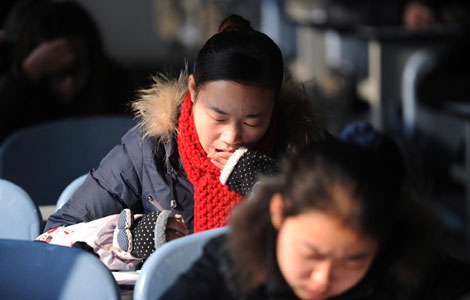China's telecom giants fail to soothe consumers
Updated: 2011-12-17 17:32
(Xinhua)
|
|||||||||||
BEIJING - A rising swell of online public opinion shows that consumers won't easily let go of China Telecom and China Unicom, which stand accused of Internet access monopoly, although they have pledged to increase broadband speeds and lower charges.
Earlier this month, the duo applied to the country's price regulator ?for a suspension of the monopoly investigation which began in November, saying they had recognized problems and promised to improve their services.
China Telecom vowed to cut broadband charges by around 35 percent in the next five years, while China Unicom agreed to lower broadband service costs without specifying how and when.
"Is 35 percent enough? To what extent should prices be lowered? They need to inform us of their costs and profits," said Zhu Zixi, a white-collar worker in Beijing.
Yang Fei, who spends 20 hours a day connected to the Internet, was also deeply concerned. "The two companies didn't provide specific measures but used ambiguous words on breaking the monopoly. I'm afraid they can hardly keep their promises, and consumers will eventually get hurt," he said.
Zhu and Yang's comments are consistent with millions of Chinese Internet users' jitters that the nation's first anti-trust probe would end prematurely, based on the two telecom giants' unenforceable promises and no guaranteed eradication of monopoly.
On November 9, an official with the National Development and Reform Commission (NDRC), China's top economic planner as well as price watchdog, said it was investigating China Telecom and China Unicom, which together control 90 percent of the country's broadband business, over suspected monopolistic practices.
The number of broadband users in China has increased from 9.8 million in 2003 to 390 million in 2011, according to surveys conducted by the China Internet Network Information Center.
But charges have remained high in the past eight years despite the expanded market size.
"With increasing Internet users and development of telecommunications technology, operation costs would fall significantly in L shape. Charges should be lowered accordingly," said Yang Peifang, a telecom expert with China Information Economics Society.
Other experts agreed that there was greater room for the two companies to lower charges and raise speeds.
Cao Junbo, chief analyst at Internet consulting group iResearch, cited developed countries as examples.
Broadband charges in Japan, South Korea and Britain are almost at the same level as China, but the access speeds are several times faster, Cao said.
Meanwhile, experts noted that the anti-monopoly probe should not be suspended. Instead, the current duopoly should be abolished by introducing fair competition, which will make broadband access costs fall to reasonable levels.
"If the monopoly is removed, the prices would be much lower than the two companies promised. The duo's commitments merely show that they are trying to bargain with the NDRC," said Kan Kaili, a professor at the Beijing University of Post and Telecommunications.
Yang Peifang added that to break the monopoly in the sector, the government should set a price ceiling for broadband access and make use of market competition to adjust prices.
Currently, the NDRC is addressing the two giants' applications in accordance with relevant laws, it said.
Hot Topics
HIV/AIDS, Egypt protest, Thanksgiving, climate change, global economic recovery, home prices, high-speed railways, school bus safety, Libya situation, Weekly photos
Editor's Picks

|

|

|

|

|

|







